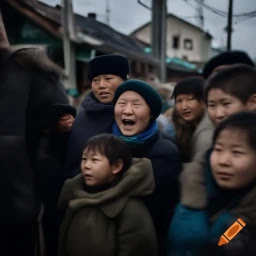In the small village of Dongsan, nestled near the military demarcation line between South and North Korea, whispers of opportunity filled the air. Just a few months ago, the village had been quiet, a place where time seemed to slow down, with little happening beyond the ordinary rhythm of life. But rumors had begun to circulate—rumors that the North Korean regime was planning a large-scale conscription, drafting scores of young people and sending them off to fight in Ukraine. Tension gripped the North, and the whispers had spread that, in the chaos, there might be an unprecedented wave of defections.
In Dongsan, this news sparked a flurry of activity. Entrepreneurs, local families, and even government officials began laying the groundwork for what was being called the “border boom.” Private lodgings were being built, entertainment facilities planned, and even the quiet village pub saw an opportunity to expand, anticipating the surge in traffic from defectors crossing the line into South Korea. These young escapees would be welcomed and protected by the South Korean authorities, but they would need shelter, food, and rest after their perilous journey. Dongsan was eager to meet that demand.
The village had already begun reaping the benefits of this rumor-fueled speculation. New guesthouses were under construction, cafes were opening, and plans for a temporary market to sell essentials to defectors were well underway. The railway and road connecting the village to the North, though rarely used in recent years, became the focus of many conversations. If the defectors were coming, these roads would become lifelines.
Then, on an otherwise peaceful afternoon, everything changed. A thunderous explosion echoed across the border, sending a shockwave of fear through Dongsan. The North Korean government had blown up the railway and road leading to the South. The official statement from the North declared the destruction as a necessary and legitimate act, citing the newly revised DPRK constitution that now defined South Korea as a hostile state.
For Dongsan, the message was clear: North Korea would not allow its citizens to flee, and any dreams of a flourishing leisure industry were now in ruins. The explosion wasn’t just about roads and rails; it was a warning, a physical and psychological barrier reminding everyone that defection would not be tolerated.
The once hopeful village was plunged into uncertainty. The rumors about conscription and defections still lingered, but without the roads, the paths to freedom were now treacherous, if not impossible. Families in Dongsan, who had hoped to benefit from the situation, now found themselves trapped in a different kind of uncertainty, wondering if the village would ever see the influx of North Korean defectors they had prepared for.
As the dust settled, the village’s plans for the future lay shattered along with the blown-up roads, leaving Dongsan to ponder its next move in a world where even the simplest of hopes could be dashed
All names of people and organizations appearing in this story are pseudonyms.

Comments